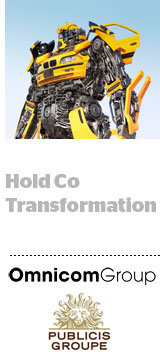
Both Publicis Groupe and Omnicom focused on the need to transform their clients’ businesses and their own during their respective Q2/H1 earnings on Thursday.
“We want to be the leader in marketing and business transformation,” Arthur Sadoun told investors on his first-ever earnings call as Publicis Groupe CEO. “Our clients need to transform.”
Publicis saw organic growth of 0.8% for the quarter and -0.2% for the first half of the year. Revenue for the quarter was $2.9 million and for the half it was $5.5 million.
At Omnicom, global revenue decreased 2.4% to $3.8 million this quarter and 0.1% to $7.4 million for the half-year, largely due to the deceleration of the British pound.
New Regime
The biggest growth engine for Publicis Groupe will “come from our ability to be positioned not as a communications partner, but as a partner that can bring digital business transformation,” Sadoun said. That will involve leveraging data and technology to deliver on clients’ business objectives and help them transform to regain control of the customer journey.
It also requires Publicis agencies to work together more fluidly. Sadoun will continue to break silos across the group at the country level, co-locate and incentivize cross-agency teams based on client needs, train employees on business transformation skills and scale specialist practice areas to support global agency brands.
“You can’t expect to own the consumer journey if you have separate P&Ls,” Sadoun said. “We need to make sure any client can enjoy the power of the group without competition.”
Transformation has been costly for Publicis. In the first half of 2017, the group spent $120 million on restructuring costs.
But Sadoun said the group is ready to shift its focus from reorganizing to execution and training.
“We have simplified our structure, rationalized IT systems and management tools, [merged] SapientNitro and Razorfish and ended nonprofitable contracts,” Sadoun said. “We need to accelerate the execution and go deeper in integration.”
The company will pay ongoing development costs, however, specifically for artificial intelligence platform Marcel, which Publicis is building to connect its 80,000 global employees in a virtual, collaborative workplace. Publicis Groupe Chief Financial Officer Jean-Michel Etienne reassured investors that “investment in Marcel will be capitalized” and that “by 2018 we’ll be back to normal” in terms of offsets from restructuring costs.
Fluid Structures
Omnicom CEO John Wren also touched on transformation during his company’s earnings call.
“As I look across a range of industries, each is undergoing major changes driven by advances in technology, changes in consumer behavior and new competitors,” he said. “Against this backdrop, we are making sure we can affect change in the nimblest manner.”
Like Publicis, Omnicom will invest in training initiatives that educate talent on modern marketing problems. It will also continue to reorganize around a “matrix and practice structure,” Wren said, which offers support to agency brands in specialist areas and makes it easier to collaborate based on client needs.
Operating more fluidly will be critical as clients look to simplify their agency relationships, Wren said.
“Better sharing of expertise and knowledge … is making us more agile and responsive so we can adjust quickly as clients need to change,” he said.
Despite an urgency to work more fluidly across their groups, both Wren and Sadoun said the agency brand will still remain relevant in their respective organizations.
“I believe in the power of the brand for my clients, so I believe in it for our own companies,” Sadoun said. “The question is, how can you break the silos? Which is an absolute necessity.”
This post was syndicated from Ad Exchanger.

More Stories
Lani Jamieson joins D3 to shape the next chapter of its growth
CBS Stations Partners with Waymark to Create Local Ads with Artificial Intelligence
The One Show AI judge Sherina Florence releases hip-hop album for deadline push